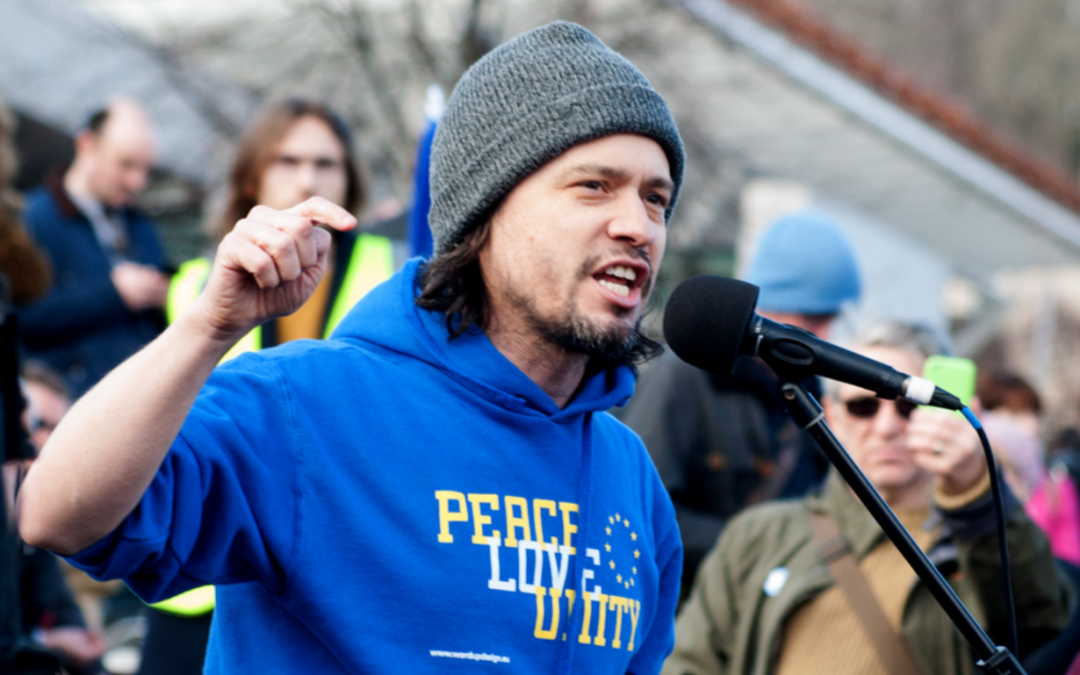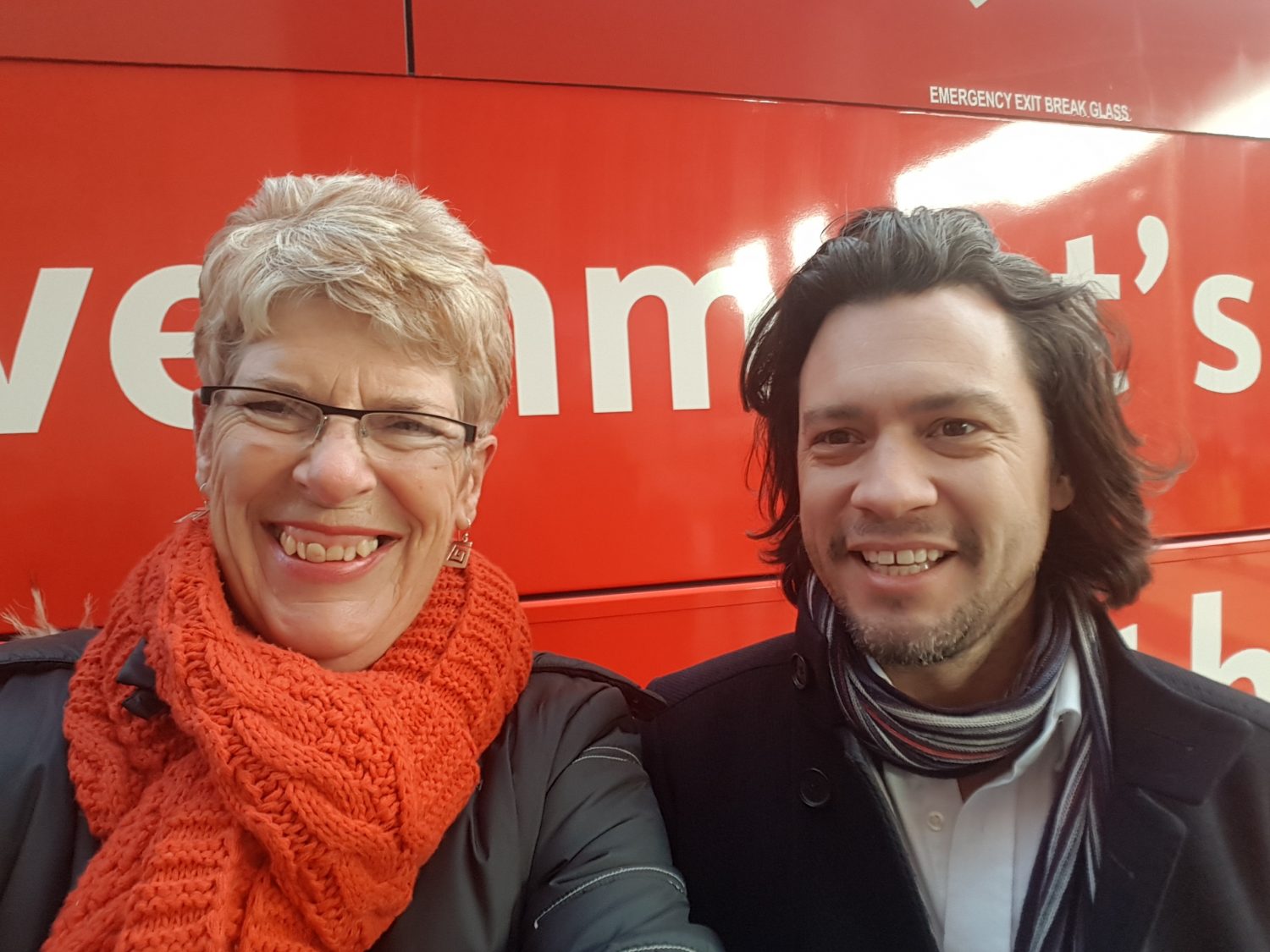This month’s edition of “Bremainers Ask” features Dr. Mike Galsworthy, Director of Scientists for EU, which he co-founded in May 2015. He is also Director of NHS for a People’s Vote. These are two of the founding groups of the PV campaign. Mike is also Head of the Social Media Intelligence Unit (SMIU) and a Director of the March for Change team. Previous to initiating the campaigns, Mike was an independent consultant in research and innovation policy. His work before that was in health services research, based at UCL and the Royal College of Anaesthetists. Below, he answers a selection of questions put forward by Bremain members.
Roy Stonebridge: Once Brexit is cancelled, how will the UK begin to attract back foreign scientists and other talent who have left or become disenchanted with the UK over the last 3 years?
Mike Galsworthy: Hi Roy. A lot will come down to the tone of the country at the time. Will it suddenly look like an attractive place for scientists to work in? Yes, the pound would bounce and free movement would be back in force – hopefully with favourable visa rules for non-EU researchers too, Theresa May’s limits axed and the length of time students can stay after their degrees still two years. However, if the country is racked with political division and vitriolic narrative towards foreigners, that’ll hurt our attractiveness. So one of the best ways to mitigate against that would be to invest in abandoned communities. You can also, like Switzerland which also has free movement, require businesses to advertise jobs locally before they advertise to the rest of the country or internationally. That way you’re clearly protecting local communities. Then you need a public awareness campaign about just how many jobs for Brits foreign entrepreneurs create and how much boost foreign researchers provide to our world-leading universities and with it our students. Finally, you need more projects between universities – making sure that local communities are improved by their universities and can see that universities have their back and improve their local businesses, communities and opportunities.
Tracy Rolfe: What effect would Brexit have on medical research?
Mike Galsworthy: Hi Tracy. If you want the fullest answer to that question, you can read this!
What’s that? It’s probably the first ‘impact assessment’ done on health, health research and Brexit. In 2017, before the Government got caught bragging about impact assessments they hadn’t done, we actually did one and published it in ‘The Lancet’. We looked at what soft Brexit, hard Brexit and “failed Brexit” (i.e. no-deal Brexit) would mean for everything around healthcare, health research and medical research. In short – it is bad impacts across the board, with no-deal Brexit being the worst. Specifically, it impacts our role on the Horizon 2020 science programme (about 20-30% of which is in health/medicine). Theresa May’s deal would have preserved most of that – a no-deal trashes it. Inward investment into all science has dropped. In the pharma industry, companies have spent tens of millions shifting parts of their processing to the European mainland to prepare for changes in rules. If we leave the single market for medicines, then we suddenly become a smaller market which is devastating for our role in testing new medicines. Switzerland and Canada get their cutting-edge medicines 6 months after the EU on average. We’ve already lost the European Medicines Agency with 900 jobs, attendant industry and tens of thousands of business visits a year. That hugely hits our medical innovation ecosystem. Leaving the Single Market also hits the medical devices industry, as divergent rules make for a barrier. Hiring talent becomes harder with the utter mess left around free movement and citizens’ rights. This also then impacts on hospitals and the medical research they can do if they are stretched for money, collaborations and funds.
Mike Galsworthy: Hello Pat. Not as much as we would like, of course! The major breakthrough has been that we now have enough parliamentarians to fight for the cause. The critical balance has been tipped and now Johnson is running a dead government which is handed instructions by a very live parliament. However, we still need to shift more public opinion. Although polling shows that more people think the Brexit vote was a bad idea than a good idea – and that gap is growing, nevertheless, there are many people who are buying the “just get on with it” narrative. They know Brexit is a mess, but just want to see it “done”. Now of course we know that “doing” Brexit means opening Pandora’s Box and causing more chaos – this isn’t yet cutting through as it should. Many people want to follow the path of least resistance… We *also* need the positive message about the future we all want – and that must be in the form of climate change demands, preserving jobs and traditions and tackling inequality – then showing why the EU structure is critical to achieving those. We’ll need communities peripheral to our own (e.g. youth on climate issues, conservatives on farming traditions) to help carry those messages.
Pat Laing: How much damage do you think Gove caused with his “we’ve had enough of experts” comment?
Mike Galsworthy: Not much, actually. The anti-expert sentiment was alive and well at the time – and that statement brought it all to a head. In a way, Gove called it out for us. During the referendum, our Scientists for EU Facebook page got so many messages about us being paid shills of the EU, on the gravy train etc. etc. It was just a case of attacking anyone who supported the EU by making personal accusations about motivation. All experts got thrown under the bus for the same thing. It was very hard to combat against by explaining, in detail, why that wasn’t the case. As soon as Gove said that thing – he gave us the perfect phrase to point at. If not experts, then whom do you trust? In fact, if you see public polls on who people do trust, nurses, doctors, scientists and teachers are still up there with journalists and politicians at the bottom. We just have to be very careful that we (like I said in my answer to Roy) make sure that we as scientists and experts always show how we have the backs of the average person in the street – how what we do is to the benefit of them and their kids, not ourselves.
Debbie Williams: Given how active a campaigner you are, how does your family feel about all the time given over to campaigning? How do you manage the work/campaign/life balance?
Mike Galsworthy: Hi Debbie – “Good one!” calls out my partner, Caroline, as I read out that question to her! Yes, it’s tricky. I don’t have a work/campaign balance as I’ve been doing this full-time now since the end of 2015. So it’s all about the campaign/life imbalance. Unfortunately, I’m a bit obsessive about this. And after setting up Scientists for EU, Healthier IN (which became NHS Against Brexit which became NHS for a People’s Vote), the Social Media Intelligence Unit, the funding plan for local Facebook pages and March for Change (with Tom Brufatto and others), I think it’s fair to say I’ve stretched myself quite thin and left little time for family life or relaxation time. The constant demands of internal politics, fundraising, and keeping up with the wild Brexit politics take a toll and I feel desperately guilty for not spending as much quality time as I should with friends and family – or often being preoccupied at such moments. So I have to keep reminding myself that it’s a marathon not a sprint – and I regularly need others to prompt me to take a break.
Elena Remigi: You have always been very supportive of the rights of the 5 million people living in limbo. How could we communicate with those that fail to understand our struggle?
Mike Galsworthy: Well, Elena, I should be asking you this as you’ve worked so tirelessly in this area. It’s really, really hard, I know. Everything seems to be fighting for attention – and the lives of those left in limbo seem to get side-lined in the noise again and again. I also know about the abuse that our non-Brit EU citizens have faced on social media simply for telling their stories – particularly women. It’s very depressing. I think sometimes the stories don’t cut through because many Brits don’t value their fellow EU citizens here as much as they should. When they hear the stories, they just think “stop complaining, you’ll be alright”. The mood is one of disinterest. We might do well to campaign on positives of immigration – how much it has helped build Britain. Getting out stats about how much foreign entrepreneurs have contributed to British jobs and the stats around how much Brits love high-skilled immigrants. Or how much Brits recognise the value of those that come to help in the care sector. That’s an easy win on validating how right the Brits are to love what immigrants can do. Then you point out how badly *the Government* has treated those very people that the British public (and British families) love and value. I think that is a powerful way to do it. But it needs more finances and more highly-visible champions.
Many thanks to Mike for taking part. You can read more about Scientists for EU here.








